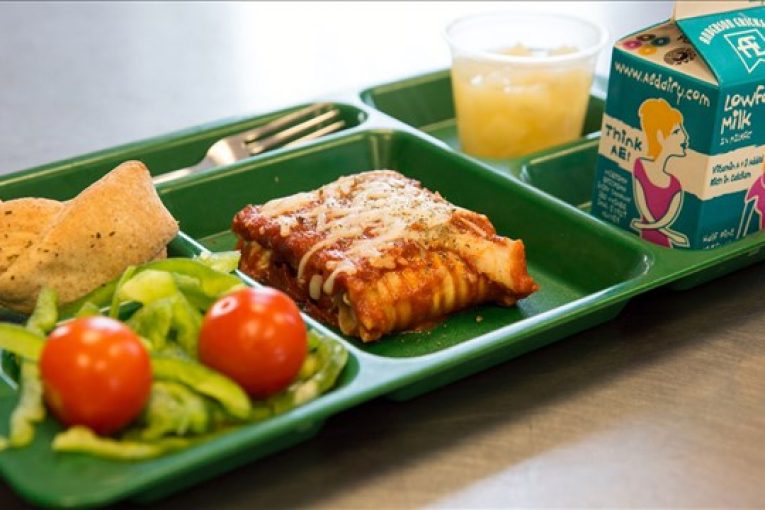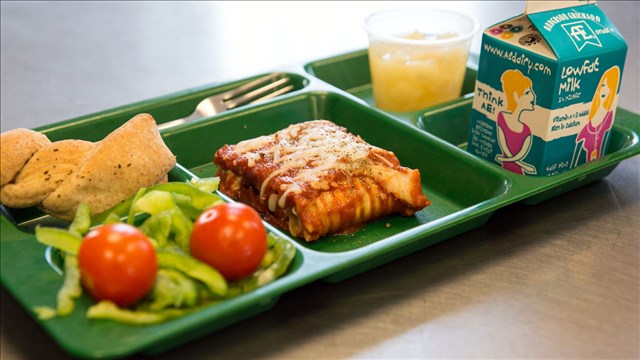

By Vanguard Capitol Staff
Sacramento, CA – It was big news this week that a bill authored by Senator Nancy Skinner, ‘Free School Meals for All’ has now become a two year bill. Funding for the bill has become available through federal and state funding in both the Governor’s May Revise and the state Senate’s Build Back Boldly Budget plan.
The funding put forward by both federal action and potentially included in California’s 2021-22 budget supports the goals of SB 364 and removes the necessity to take action on the bill this year, Skinner’s office announced this week.
“Free School Meals for All is based on a simple yet powerful premise: Our public schools are free for any child to attend, so every student should also have access to free and healthy meals made from locally grown food,” said Sen. Skinner, chair of the Senate Budget and Fiscal Review Committee.
She added, “The widespread support for our Free School Meals for All initiative is truly inspiring, ranging from anti-hunger organizations, schools, and public health and environmental groups to ranchers and farmers. Now that the concept of universal school meals has been embraced, the intention is to fully implement Free School Meals for All within the budget.”
“Free education for every child has long been the norm. Knowing how essential nutrition is to learning, it makes sense that free, healthy meals also be the norm,” Sen. Skinner said. “SB 364 will ensure that students are fed without the red tape schools and families are currently burdened with.”
State and federal programs fund free and reduced-price meals for schoolchildren from low-income families. But over the years, many kids have been effectively locked out of the program due to mandatory and burdensome application processes and out-of-date federal income guidelines.
During the COVID-19 crisis, the U.S. Congress passed the Pandemic Child Prevention Act to allow meals to be served to all children without these paperwork burdens. SB 364 will use this model and allow schools to continue providing meals for all children after the pandemic is over.
Though California is an abundant producer of food, our kids are going hungry at an alarming rate. Prior to the COVID-19 crisis, 15.2% of children in California were experiencing hunger, and that number has now nearly doubled. Providing a school meal to all students is an important step in addressing hunger.
“Schools needn’t be in the business of deciding who gets lunch and who doesn’t. It’s costly and contrary to the basic purpose of free education,” Skinner added. “SB 364 will end this unnecessary bureaucracy and set the table so that every student is entitled to a school meal just as they are entitled to schooling.”
SB 364 will also establish an Electronic Benefit Transfer (EBT) program to ensure that children have access to food when schools are closed during breaks and prolonged disasters. The proposal builds on the current Pandemic Electronic Benefit Transfer (P-EBT) program, recently established by the federal government to ensure that kids have access to food while schools are closed during the pandemic. In recognition of California’s vibrant agriculture economy, SB 364 also prioritizes food grown and produced in California.
“As the nation’s largest agricultural economy, California farmers and ranchers could be the heroes of food security and feeding our future, our children,” said Kat Taylor, founding director of TomKat Ranch Educational Foundation, a co-sponsor of School Meals for All. “SB 364 is a bold vision to make California the first state in the nation to provide all kids with nutritious, locally grown school food.
California is poised to become the first state in the nation to advance a universal meals program to all public school students, regardless of income, thereby eliminating the stigma surrounding free and reduced-price lunches.
The 2021-22 state budget will be completed by June 15. As a two-year bill, aspects of SB 364 not addressed in the state budget will be eligible for Senate action this coming January.
Support our work – to become a sustaining at $5 – $10- $25 per month hit the link:






Do all the school lunches look as good as the one in the picture? My grandkids would say different.
I feel California should also give food stamps to all of its residents to eliminate any stigma surrounding that program.
What stigma? You hit the ebt button and slide your debit card. No one even knows.
Honest question. What stigma is there for getting a free school lunch? Are the students signaled out somehow? My grandkids don’t get free ones, but when they buy them nobody knows they were paid for because it’s paid for ahead of time, not at the school lunch counter.
I asked my grandkids about the free lunch program at their elementary school. They said they have no idea or even care who gets free lunches. I don’t think adults give children enough credit.
So where’s the stigma?
It did? Served where, at the school Denny’s ?
Because schools provide meals for children ? I thought schools taught an education. And how did they provide meals during the pandemic? The Denny’s on campus was exempt from the Lockdown?
So more free meals for anyone who wants it, until the federal gravy train derails? At which point, you have to work to buy food for you family again, or use welfare, except family budgets now include having the gov’t pay for food, so a net drop in wealth ?
Oh, OK, the Denny’s was closed. The gov’t issued a credit card that dispense money in grocery stores, but magically limit it to ‘healthy, locally grown food’ – no European gummy bears. How’s that working?
Interestingly, the bill would feed all children in PUBLIC schools… regardless of family income… yet, the kids who are home-schooled, in private or parochial schools are not eligible, regardless of family income…
Facts:
Many students from low/very low income families attend parochial schools, often with tuition “covered” by donations of their churches… many are accepted even if they are not parishioners…
Parents of children in home-schooling, private, or parochial students pay their “full freight” in taxes that support public schools, including free meals for kids in public schools… but that is a one-way street…
This bill means rich families with kids in public schools get a ‘freebie’ as to meals… poor families who home-school, attend private or parochial schools… well, they’re on their own as to meals for their kids… guess it ‘serves them right’ for not enrolling their kids in public schools… regardless of the fact that they pay taxes supporting public schools, regardless of family income… brilliant by the ‘public school industry’, their employees, and their unions…
Can’t the legislators at least credit those with no kids in public schools with having their ‘contributions’ written off as ‘charity’? Thanks to the Republicans, CA taxpayers (at a certain level) can’t deduct any of the tax increment…
Point understood. But I also understand that parochial and private schools are not obligated to meet all the standards and regulations that a public school is required to meet. Services for special ed students? English as a second language students? IEPs/504 programs? Services for migrant student education? Even a broad obligation to be accessible to students from low income. Private and parochial schools may come and go for whatever reason, but public schools have to be there for everyone all the time. Do all private/parochial schools have cafeterias to serve lunch?
The point I’m getting at is that private and parochial schools may like to have that lunch money, but it may well invite certain collateral government regulations here and there that those schools might appreciate avoiding.
Difference is between “legal obligation” and “moral/ethical obligation”… actually, in the Diocese of Sacramento, although not ‘legally’ obligated, they do as well or better than the SUSD… by your metrics… funded not by taxpayers… funded by folk who pay into both systems…
Public schools do what they ‘have to do’, by law… other systems do it by conscience, ethics, morals… public schools tend not to recognize those three (and school employee unions definitely do not)… they (public schools) do it by ‘law’… often, reluctantly… for fear of funding reductions/sanctions or lawsuits… private schools (for profit, non-faith-based) MIGHT fit your argument…
Still, low and very low families in private, parochial schools, have no subsidies from public sources, for instructional costs, nor food for the kids… fact.
Your riposte falls flat as to reality…
Not all, but many… I know of 3 that spouse has worked in, did… 3 out of 3… total experience with our kids, 4 out of 4…
Nice try… can guess you’d like to see all private, or parochial schools be either crippled, or banned… gotta’ love the “public school industry”… should be a monopoly, right?
Two of our kids were in both, from time to time…
That’s not true. If families and the community want it and can generate the resources, great.
Thank you for sharing your experiences.
Why does a private school need to have a special ed program?
Suppose you have a budget of $1000 per normal students and $1500 per special ed student, why does it matter whether a school has special ed program if the money goes to the school that student actually goes to?
Public money follows a student if they transfer from one public school to another public school. It does not follow a student who transfers from a public school to a private school. Private schools are often funded by tuition and fees charged to a family or from other sources.
CalMatters, 8 June 2021: Will California public schools continue free lunches for all?